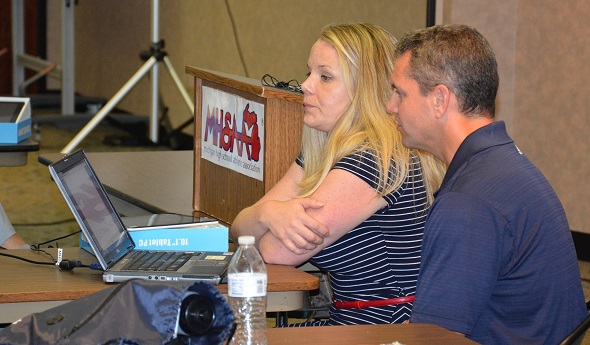
Concussion Testing Pilots Kick Off Fall
August 4, 2015
By Geoff Kimmerly
Second Half editor
The Michigan High School Athletic Association kicked off the 2015-16 school year Monday by hosting 70 member high schools for training in two pilot sideline concussion testing programs aimed at assisting in decision-making regarding the removal of athletes from activity after possible concussion events and record-keeping of those events beginning this fall.
Illinois-based King-Devick Test and Maryland-based XLNTbrain Sport each will be used to monitor approximately 10,000 Michigan high school student-athletes drawn from schools representing all four classes and a variety of regions statewide.
The pilot programs are part of a three-pronged advance by the MHSAA in concussion care this fall. In addition to becoming the first state association to offer pilot sideline concussion testing, the MHSAA will be the first to mandate record-keeping by member schools of all possible concussion events from detection to an athlete’s return to play. The requirement applies to both practices and events, all levels of all sports in grades 7 through 12.
The MHSAA also this fall is the first state association to provide all participants at every MHSAA member high school and junior high/middle school with insurance intended to pay accident medical expense benefits – covering deductibles and co-pays left unpaid by other policies – resulting from concussions sustained during MHSAA practices or competitions. There is no cost to either schools or families.
“These pilot programs are intended to not only improve what’s actually happening on the sidelines at practices and contests in these communities that are part of the pilot programs, they’re intended to spread the word of the need for improved concussion detection across every community,” MHSAA Executive Director John E. “Jack” Roberts said. “We hope these schools involved will become involved in their leagues and conferences and with their peers across the state as we expand the awareness of the need for better sideline detection and provide ways to get it done.”
The MHSAA asked schools at the end of this spring to volunteer for the pilot programs and then selected participants in order to guarantee a variety of schools based on enrollment and location. Schools are committed to involving at least two sports for each gender each season.
Schools participating in the XLNTbrain Sport pilot program are: Adrian, Adrian Madison, AuGres-Sims, Bay City Central, Bear Lake, Brethren, Belding, Birmingham Groves, Brighton, Chesaning, Corunna, Detroit Collegiate Prep, East Kentwood, Fennville, Fowlerville, Gibraltar Carlson, Grand Rapids Christian, Grandville, Greenville, Grosse Ile, Hamilton, Harrison Township L’Anse Creuse, Hazel Park, Kalamazoo Christian, Lansing Christian, Macomb L’Anse Creuse North, Owosso, Pewamo-Westphalia, Portland, Reese, Rochester Hills Lutheran Northwest, St. Clair Shores Lakeview, St. Johns, Stanton Central Montcalm, Vermontville Maple Valley, West Bloomfield and Wyoming Kelloggsville.
Schools participating in the King-Devick Test pilot are: Bay City Western, Benton Harbor, Buchanan, Calumet, Caro, Caseville, Detroit Cody, Detroit Martin Luther King, Fenton, Flint Kearsley, Frankenmuth, Fruitport, Garden City, Grand Ledge, Grand Rapids Northview, Lake Leelanau St. Mary, Lake Linden-Hubbell, Lincoln Alcona, Midland Bullock Creek, Montague, Muskegon, Niles, Pontiac Notre Dame Prep, Romeo, Saginaw Heritage, Scottville Mason County Central, Shelby, St. Charles, St. Joseph, Tawas, Vicksburg, Whitehall and Yale.
The King-Devick Test is a rapid eye movement screening evaluation that requires athletes to read single-digit numbers displayed on a tablet computer in order to detect impairments of eye movement, attention, language, concentration and other symptoms of abnormal brain function. The test has been validated in more than 50 recent peer reviewed articles published in elite medical journals and is associated with the Mayo Clinic.
The test is administered on the sidelines during evaluations for suspected head injuries, and the post-injury results are then compared to an athlete’s preseason baseline. Any worsening of performance (increased time and/or errors) suggests a concussion has occurred and the athlete should be “removed from play” for further evaluation.
“The first and most critical step in managing concussion in the youth athlete is to recognize when one has occurred – not always a simple task,” said Dr. David Dodick, professor of neurology and director of sports concussion services at the Mayo Clinic. “The King-Devick test helps take the guesswork and subjectivity out of the sideline evaluation in a rapid, accurate, and objective way.”
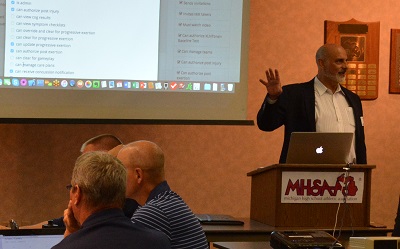 XLNTbrain Sport includes balance and web-based neuro-cognitive tests also used before the start of a season to create a baseline measurement of reaction time, attention, inhibition, impulsivity, memory, information processing efficiency and executive function. The test also assesses mood, anxiety, stress and emotionality.
XLNTbrain Sport includes balance and web-based neuro-cognitive tests also used before the start of a season to create a baseline measurement of reaction time, attention, inhibition, impulsivity, memory, information processing efficiency and executive function. The test also assesses mood, anxiety, stress and emotionality.
After a possible head injury, a sideline assessment is done using a smartphone or tablet with those results then compared with the athlete’s baseline measurements. The program documents the severity of a concussion, provides a guide for on-the-field decision making regarding treatment and recovery time and can report results via email to parents, coaches, training staff and medical professionals.
Dr. Harry Kerasidis, who designed the XLNTbrain Sport software, presented at the Coalition for Concussion Treatment Summit at the United Nations building in 2014.
“We included an objective balance test that relies on smartphone accelerometer technology which is effective in the field during practice and game situations,” Kerasidis said. “Should a concussion injury be suspected, the system automatically generates a notification to parents and medical professionals and creates a recovery protocol and post-injury tracking so the right people can monitor the athlete’s progress. Then, the system assists medical professionals with the all-important return-to-learn and return-to-play clearance.”
Click for information on XLNTbrain Sport. Click for information on the King-Devick Test.
For more on Health & Safety, including preseason physical examination, hydration and cardiovascular resources in addition to concussion information and online training sessions, visit the MHSAA’s redesigned Health & Safety web page.
PHOTOS: (Top) Saginaw Heritage athletic director Peter Ryan (right) is administered the King-Devick baseline test by K-D's Samantha Figueroa. (Middle) XLNTbrain Sport creater Dr. Harry Kerasidis provides insight on his program to those being trained to use it Monday.
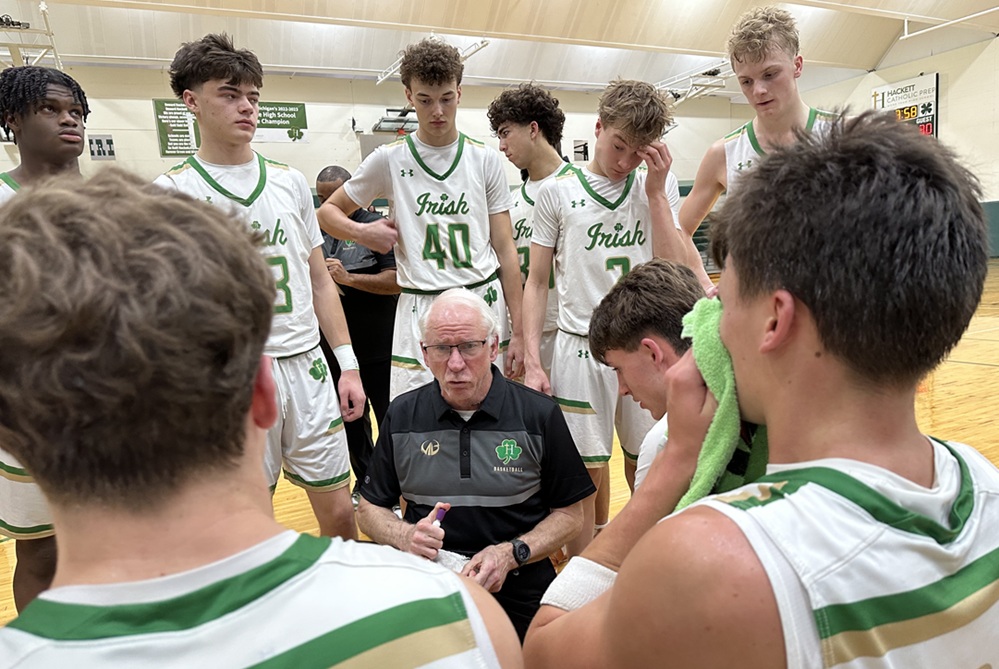
Senior Leaders, 'Legendary' Coaches Bring Plenty of Experience to Hackett Hoops
By
Pam Shebest
Special for MHSAA.com
January 27, 2026
KALAMAZOO — In their four years on varsity, Leland Berg and Lukas Husovsky have played for three head coaches, plus a fourth with the junior varsity while playing on both teams as freshmen.
 This year, the seniors are ending their Hackett Catholic Prep basketball careers with pair of “crafty veterans” – head coach Dan Hoff and assistant Nib Reisterer.
This year, the seniors are ending their Hackett Catholic Prep basketball careers with pair of “crafty veterans” – head coach Dan Hoff and assistant Nib Reisterer.
“It’s definitely been a struggle because every coach has their own way: the way they run practice, games, plays, everything,” Berg said of adjusting to new coaches.
“So from my freshman year, I walked into a program that had been a program a couple years, and then my freshman and sophomore years it totally flipped around.”
Berg, who has signed to play basketball next at Hillsdale College, said Hoff stepped in and brought a new culture.
“Hoff knows exactly what he wants to do,” the 6-foot-5 guard/forward said. “He’s very meticulous, and I feel that order and that tidiness has really cleaned up our team and the culture of Hackett basketball.”
Berg added that there are a lot of small changes, “like what time to show up for games, how practice is run, the kinds of drills we run, the kind of plays we run.
“I know it’s for the better, but it’s been difficult to adjust for me and my teammates.”
During their freshman season, Berg and Husovsky played on both the varsity and junior varsity teams, a challenge for the young athletes.
“It was really an adjustment because everybody had different plays,” the 6-7 Husovsky said. “There were so many plays you had to memorize. Not only was it physically (challenging), but mentally tough.”
Husovsky said that the seniors helped him and Berg as freshmen, and now he sees that as their job with the younger players.
Berg said this season the players are more appreciative of each other.
“When it comes to stuff off the court and personality-wise, we know how everybody is,” he said. “It makes it easier to play with these guys and it’s fun. It makes it a super comfortable team.”
Senior-led on the floor
Berg and Husovsky are two of four senior starters with Cullen McBride, David Verduzco and junior Elijah Brooks rounding out the starting five.
Hoff, who alphabetizes his personal players list by first names, said this is the first time he has no first names past “L”.
“There are four Lukes and two Elijahs out of 12 players,” Hoff laughed.
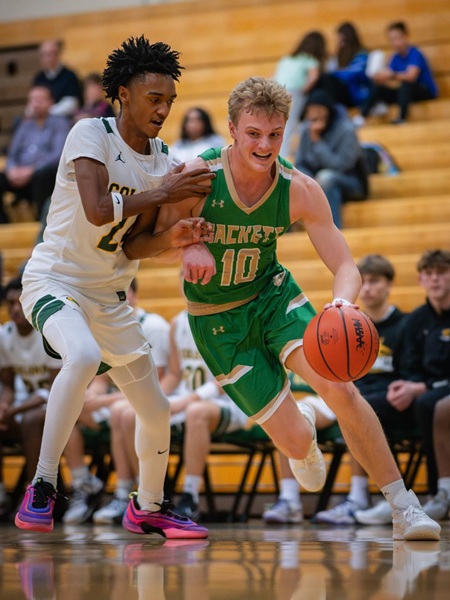 Those four are Husovsky, senior Luke Napolitan and juniors Lucas Cosby and Luke Widman. Junior Elijah Nabors is also on the team.
Those four are Husovsky, senior Luke Napolitan and juniors Lucas Cosby and Luke Widman. Junior Elijah Nabors is also on the team.
Seniors Keegan McCue and Ezra Rowekamp-Ambs plus junior Joey Gamsho round out the Hackett dozen.
After a tough loss to Kalamazoo Christian on Friday, the Irish take an 8-5 record into a tough Southwestern Athletic Conference Valley matchup against Schoolcraft.
Berg said no matter how the first half goes, this Irish team is unwilling to give up in any game.
“We had a couple of tough games where we got punched in the mouth early and we were down at halftime,” he said. “But most of those games we really found a way to group together and keep on pushing.
“I think that’s the difference between this year’s team and teams in the past. In the past, when we’d get down a lot of points early, the game would be over. Lately, there’s been a change in mentality. That’s super impressive. We don’t give up.”
Hoff said Berg is a “hidden gem” on the team.
“He’s a really good outside shooter,” Hoff said. “His energy. He starts every practice and leads us after every game with our team cheer.
“He leads our stretching. He does a lot of leadership things on the court that people don’t even know about.”
As for Husovsky, Hoff said he brings a lot of athleticism to the post with some really good skills as a shooter.
Brooks said he is comfortable with his role on the team and looks up to the seniors.
“Before games, our seniors are making sure we’re there and in the head space we need to be in,” he said.
Brooks added that he feels he’s a link that “brings everybody together. If my energy’s up, then everybody’s energy is going to be up.”
He also appreciates the new culture Hoff brings to the team.
 “Coach is really fundamentally sound, making sure every step is done precisely and on point,” he said. “Coach is a great listener and a great motivator.”
“Coach is really fundamentally sound, making sure every step is done precisely and on point,” he said. “Coach is a great listener and a great motivator.”
Hoff appreciates Brooks’ passion for the game.
“Basketball is really big in his life,” Hoff said. “He brings a toughness and a skill set that is demonstrative of how much work he’s put into it.
“He’s really such a capable player and a person whose personality is extremely powerful, and that’s what allows him to be successful at key times and with any team he happens to be on.”
More than 100 years of experience on the bench
Hoff is in his 50th season as a basketball coach, the first 49 including 27 at Mattawan and five at Western Michigan University.
“Most of what I do is in practice,” Hoff said. “During games, players tell me information and I just give them information back.
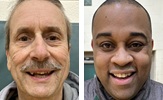 "It’s like my classroom experience. When it’s time for a test, it’s time for them to do the test. My job is to prepare them. I find that as liberating for them as for me because I’m not yelling things to them or at them (during games).”
"It’s like my classroom experience. When it’s time for a test, it’s time for them to do the test. My job is to prepare them. I find that as liberating for them as for me because I’m not yelling things to them or at them (during games).”
Hoff also said he expects his players to live up to his standards.
“When you have a 3 o’clock start, it’s a 3 o’clock start,” Hoff said. “It’s been a learning curve. I told them, one of my major flaws is I don’t know how to lower my standards so you’re going to have to come to mine.”
Hoff isn’t the only veteran coach at Hackett.
Reisterer is also closing in on 50 years coaching, including several at Hackett with both boys and girls teams.
“Staying around the players keeps us young,” he said. “I’m betting we’re one of the oldest coaching staffs in the state. We’re both 71.
“Dan is the most organized coach I’ve ever been around. He teaches the fundamentals as good or better than anybody I’ve ever come across, and he’s the perfect mentor for any young guys who want to coach.
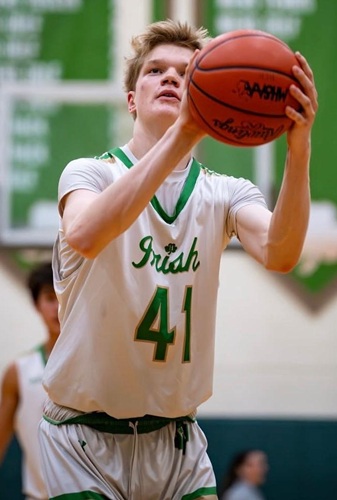 Reisterer, who graduated from Hackett in 1971, is also a member of the Irish Athletic Hall of Fame.
Reisterer, who graduated from Hackett in 1971, is also a member of the Irish Athletic Hall of Fame.
“Nib and I’ve known each other since I moved here in 1986,” Hoff said. “He coached as an assistant for me in Mattawan. We coached against each other many, many, many times and we had some really great Hackett-Mattawan rivalries.”
Another assistant also has Hackett ties.
Kevin White, class of 1998, is in his first year as the school’s dean of students.
White also has a lot of experience coaching basketball, most recently at Portage Northern.
“I’ve known Kevin almost since I moved here because he’s been with Nib all these times,” Hoff said. “I knew him when he was at Portage Northern and at (Kalamazoo College).
“He’s an in-school person, which is what an out-of-school coach needs. He’s really good at that. He keeps track of the kids in a healthy way.”
Berg said the team is responding well to a new coaching style.
“We have a legendary coaching staff, a lot of great minds,” he said.
 Pam Shebest served as a sportswriter at the Kalamazoo Gazette from 1985-2009 after 11 years part-time with the Gazette while teaching French and English at White Pigeon High School. She can be reached at [email protected] with story ideas for Calhoun, Kalamazoo and Van Buren counties.
Pam Shebest served as a sportswriter at the Kalamazoo Gazette from 1985-2009 after 11 years part-time with the Gazette while teaching French and English at White Pigeon High School. She can be reached at [email protected] with story ideas for Calhoun, Kalamazoo and Van Buren counties.
PHOTOS (Top) Hackett Catholic Prep boys basketball head coach Dan Hoff, kneeling, talks with his players during a break this season. (2) Leland Berg (10) makes a move toward the lane against Coloma. (3) Hackett junior Elijah Brooks. (4) Hackett assistant coaches Nib Reisterer, left, and Kevin White. (5) Lukas Husovsky attempts a free throw. (Action shots by Micah Jones. Headshots and huddle photo by Pam Shebest.)

